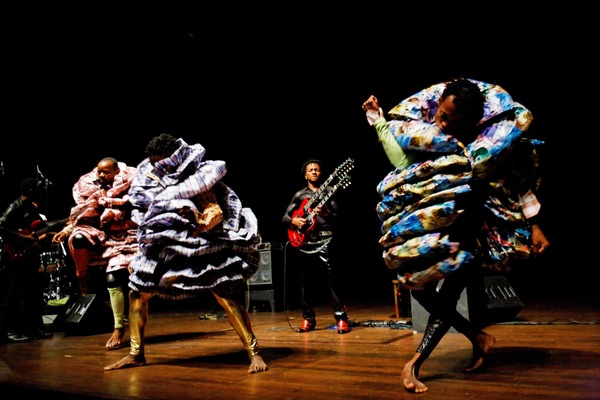Congolese performing artist Faustin Linyekula has been touring the U.S. Fresh from Yerba Buena Performing Arts Center, Calif., and the Walker Art Center, Minn., he brings more, more, more... future to New York City for The Kitchen's "Crossing the Line" festival this week, Oct 12-15.
When considering Linyekula's work and its context regarding Congo, the Congolese people, and culture, I am simultaneously prompted to look at an overarching lesson applicable for the United States' performing arts community at large. Both Linyekula's own collaborations and the work of MAPP International Productions (the company responsible for Linyekula's tour) embrace leadership and reflect the thinking of experts in the field. Harvard Business School professor, Rosabeth Moss Kanter, often writes about strong leaders who ignite individuals' enthusiasm and create models for successes that others, internal and external to the organization, can make their own. In her piece entitled How Cosmopolitan Leaders Inspire Confidence, she writes:
"Top leaders in many countries will soon be more cosmopolitan -- international, diverse in culture and gender, and values-oriented. ... they still will carry out their essential, enduring task: building confidence to master challenges and turn threats or problems into positive results. Values and vision are a starting point, but leaders must develop the vehicles for high performance."
Gaining on outside perspective is one important element in Kanter's description of a cosmopolitan leader. Much like these leaders, Linyekula lived abroad as a choreographer and dancer and returned to Congo in 2001. In an interview for TimeOut New York, he shares,
"[it was] hard [to realize] that, somehow, nobody cares about the arts [in Congo]. But people do care about seeing someone who believes in something in a context where it's so difficult to believe in anything... The fact that the work is recognized in Europe and in America means that I can be taken seriously back home and that what I'm saying means something."
My exploration of Linyekula's past works and continuing projects provide much food for thought. In the interview for TimeOut New York, Linyekula speaks of his process and inspiration. The lyrics that flow in tandem with movement in more more more were derived from poems written from prison by Antoine Vumilia Muhindo. Linyekula grew up with Muhindo in Congo. He visited him in prison in order to commission these words. Flamme Kapaya composed and performs the music, which drives the movement and words of this work. Linyekula choreographed the work not in a spacious studio, but in the living room of a rented house -- where instruments and bodies met. The idea of life and art co-existing in such close proximity, seems a foundational tenant of Linyekula's project, Studios Kabako. Located in the city of Kisangani, Studios Kabako, is a company and art center 'dedicated to contemporary dance and visual theater. Studios Kabako aims to both address artistic and aesthetic issues and foster professional skills through research, creation and circulation. It provides training opportunities for artists, management and technical staff with a focus on nurturing artists to explore new ideas and collaborations both at home and abroad.'
Returning to the words of Rosabeth Ross Kanter,
"Leaders must deliver confidence at every level: self-confidence, confidence in each other, confidence in the system, and the confidence of external investors and the public so that their support is warranted." "Leadership," states Kanter, "involves motivating others to their finest efforts and channeling those efforts in a coherent direction."
Leaders in the performing arts may come from distant shores or from your home town and must be versed in the languages of human experience. Programs like Studios Kabako (and the DeVos Institute of Arts Management here in the US) that combine creativity, development, and management are essential . Artists such as Linyekula are much like 'cosmopolitan leaders.' As they travel, they bring with them their creative work, but perhaps more importantly, they bring their memories, their perspectives, and provide opportunities for communities to learn. We need leaders to foster growth, and we need to celebrate the performance of leadership as a vital aspect of the field. Faustin Linyekula, as a man of action, has much to offer our collective choreography of the future.
more, more, more... future will continue to tour the U.S. through October. Next stops include: VSA New Mexico/North 4th Art Center in Albuquerque (October 18), and the Museum of Contemporary Art in Chicago (October 21-23). Visit the MAPP International Productions website for more information.
